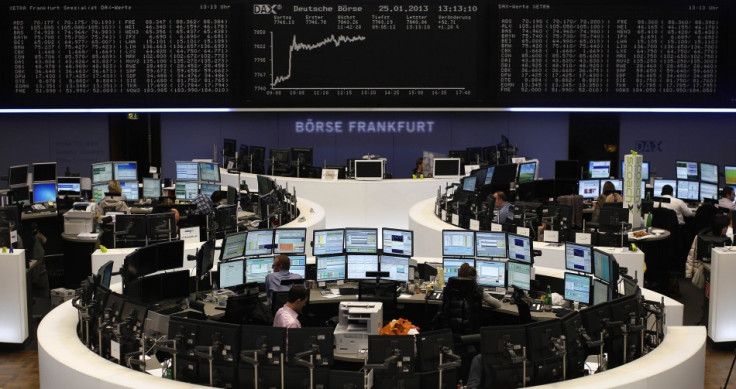European Stocks Decline Ahead of Key German Data

European stocks eased in the opening minutes of trade as investors awaited key Germany ZEW survey data for indications on economic conditions.
Europe's FTSEurofirst 300 index which tracks the region's top stocks fell 0.1 percent to 1,158.18. The UK's FTSE 100 and France's CAC-40 dropped 0.1 percent each while Spain's IBEX fell 0.1 percent.
Italy's FTSE MIB and Germany's DAX were down 0.2 percent respectively. The single currency eased against the dollar, trading at about $1.33.
Germany's ZEW index of economic sentiments is set for release during the day which analysts expect to show further improvement from the previous month's sharp progress. Later this week, Germany's IFO survey figures and euro area's flash purchasing managers index (PMI) data is expected to be released.
Market sentiments were also influenced by European Central Bank (ECB) president Mario Draghi's comments that dismissed "currency wars" while suggesting that the central bank will continue to consider the economic impact of a firm euro.
Draghi indicated that although exchange rates are not a policy goal, it is critical for economic growth and price stability. His comments had given rise to speculations that ECB may resort to monetary easing measures in a bid to soften the single currency and inflation concerns.
Asian markets had ended mixed earlier with Japanese stocks retreating after the yen firmed against the dollar and the euro, ahead of the announcement of Bank of Japan's new governor.
The Nikkei eased 0.31 percent to 11372.34 in Tokyo. Australia's S&P/ASX 200 gained 0.37 percent to 5081.90 while South Korea's benchmark KOSPI added 0.20 percent to 1985.83.
China's Shanghai Composite Index slipped 1.60 percent to 2382.91 while Hong Kong's Hang Seng dropped 0.76 percent to 23204.83 towards close.
The yen had begun the week on a bearish note after the G20 ministers stopped short of directly criticising Japan's recent aggressive efforts that devalued the currency. But sentiments soon changed and traders started to buy up the yen after the country's finance minister ruled out foreign bond purchase as an option for monetary easing.
Traders also remain cautious ahead of the announcement of Bank of Japan's next governor which is expected after Shinzo Abe's return from the US trip. Abe is widely expected to choose a more dovish successor to the present central bank chief Masaaki Shirakawa as he seeks to initiate aggressive stimulus measures that could help shore up Japan's ailing economy.
Analysts suggest that the yen which had weakened about 20 percent against the dollar since November could continue its downward spiral as more monetary easing steps look set to follow. Japanese stocks had soared in the recent weeks as the weak currency boosted earnings hopes for exporters.
"Initial strength is being seen in the yen this morning as the market digests comments from Finance Minister Aso regarding policy," said Jason Hughes, head of premium client management at IG markets in Singapore.
"However, a move down in USDJPY by 30 points is hardly noteworthy in the current climate".
© Copyright IBTimes 2025. All rights reserved.

















